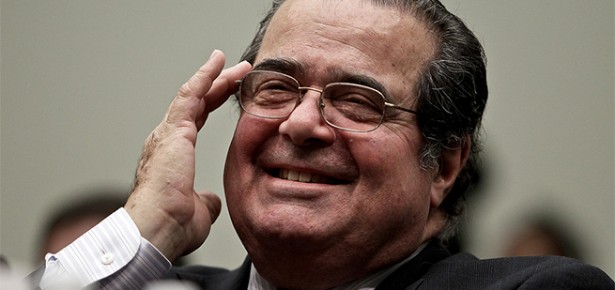
In late 2011, when I started what turned out to be The Unexpected Scalia: A Conservative Justice’s Liberal Opinions the furthest thing from my mind was that the book would play a role in the confirmation of Justice Scalia’s successor. It took a remarkable confluence of events, starting with my finishing the book in the summer of 2016 and finding a publisher. Beyond that, events had to conspire to produce the unexpected death of Scalia in February 2016, the refusal of the Republican-held Senate to hold a hearing on Scalia’s successor, followed by the remarkable victory by Republican Donald Trump. Several of these events are still a shock to me.
I first met Antonin “Nino” Scalia in the fall of 1958, when I was a third year student at Harvard Law School and an editor of the Harvard Law Review when he joined the Review as a second-year student. We were friendly, but not friends. The relationship persisted intermittently for over 40 years, during which we had a couple of lunches, a couple of get togethers for drinks, and a couple of dinners, all when he was working in Washington.
In 2002, after my wife and I had sufficiently recovered from Bush v. Gore, she and I invited Nino and his wife Maureen for dinner. Despite the fact that we were ardent liberals and disagreed with the Scalias on virtually everything imaginable, we all had a great time. From then until Nino’s death we got together frequently, usually for a dinner for four at our house in Washington, but also theirs, and, with or without wives, to go to the opera, baseball games, and horse races (I was a one-third owner of a successful thoroughbred breeding and racing stable, the Nonsequitur Stable, LLC). I joined Nino for lunch in his Chambers after the occasional oral argument I attended. The Scalia joined us for dinners at wine societies I belonged to and elsewhere. We spent a week together in Galway, Ireland, where Nino was teaching during the summer recess. We had a ball.
Nino and I occasionally talked about my writing a book about him to follow the biography of Judge Henry Friendly that Harvard University published in 2012. He had read the book in manuscript and provided numerous valuable suggestions. We agreed that a biography of him was a bad idea, because I would have to probe into his nonjudicial life and views, and we were too good friends to risk our relationship. I up came with the idea of doing a book on his judicial philosophy. He liked that. I started in late fall 2011. After a few months I realized that he had authored many more liberal opinions than anyone realized. His reputation was as an unrelenting originalist, textualist, and conservative. I suggested that I write the book from the perspective of his liberal opinions. He loved that.
While not the primary focus of our relationship, we spent much of our time talking and arguing about his opinions and nonjudicial writings. Arguing about the death penalty was not particularly fruitful. Arguing about abortion was impossible. As I progressed, I had more and more questions about his opinions, such as why he accepted some originalist accounts and not others, especially in the area of gun rights and gun control. These did not enlighten either of us especially; we were both pretty much committed to our positions. As I said in my book, I was reduced to urging him to demonstrate the Christian value of mercy.
I spent some time asking him more mundane questions about his opinions, such as what the legal source was for a statement he made without citations; was it the Constitution, common law, or something else? I remember emailing him about a particular difficult (I am tempted to say obtuse) opinion of his, but he was a superb writer. I told him that no matter how hard I tried I could not understand what he was saying. Seconds later he responded: “Try harder.”
Unfortunately, time ran out before I could ask Justice Scalia the many more questions I developed during the last months of writing and editing. I had decided early on that I would not include anything from our conversations in the book because he was a sitting Justice. When he died, I relaxed that bar and added some of his comments that directly bore on the cases. None of them is earthshaking, but they have served to clarify in some instances. I still have many questions left.
Latest Comments
Have your say!